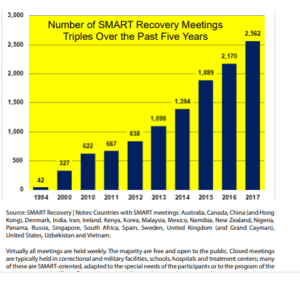What is SMART Therapy?
SMART Recovery was founded in 1992 and stands for Self-Management and Recovery Training. This nonprofit organization promotes abstinence and hosts support meetings similar to Alcoholics Anonymous and Narcotics Anonymous, however, SMART is a self-proclaimed alternative to such twelve-step programs. A unique facet of SMART is the belief that addiction is a habit, not a disease. This theory maintains that addiction is not a lifelong affliction, rather a dangerous habit that needs to be eliminated. By implementing scientific strategy and cognitive behavioral therapy, SMART utilizes validated, scientific methods designed to encourage and maintain sobriety.

How Does SMART Work?
SMART Recovery Therapy relies on tools and various exercises during group sessions. All weekly group meetings are free of charge and confidential. The treatment program revolves around two cornerstone exercises: the 4-point program and ABCs as listed below:
- Building and maintaining the motivation to change
- Coping with urges to use
- Managing thoughts, feelings, and behaviors in an effective way without addictive behaviors
- Living a balanced, positive, and healthy life
ABC’s
A: Activating Event – Any event that triggers an individual
B: Beliefs – What does the individual believe about the activating event?
C: Consequences – What does the individual do as a result of this event?
D: Disputes – Dispute unhealthy beliefs regarding the event. Dispute the urge to rely on addictive substances.
E: Effective New Belief and Emotional Consequence – What healthy belief can I replace the destructive belief with?

SMART therapy combines cognitive-behavioral therapy, motivational enhancement therapy, rational emotive behavior therapy to address these points. SMART Recovery also recognizes the different stages of recovery and has created a comprehensive outline titled the 5 Stages of Change:
- Precontemplation – The stage at which an individual may not think they have an addiction
- Contemplation – The individual evaluates their condition
- Determination/Preparation – The individual decides to take action against addiction
- Action – The individual seeks new coping strategies through therapy
- Maintenance – Addictive behavior has been altered and the individual seeks to maintain sobriety
- Graduation/Exit – An individual has maintained prolonged sobriety and trusts themself to utilize exercises and coping skills learned while in program
While many participants utilize the SMART therapy method as a sole treatment, it can also be used as a supplement to various recovery programs.
SMART in Numbers
As of 2017, SMART Recovery hosts 1,445 weekly meetings in the United States and 1,098 internationally, totaling 2,543 weekly meetings held worldwide.

Is SMART For You?
Fortunately, addiction recovery has improved drastically over the decades. This improvement has led to an onslaught of new and ever-evolving therapeutic methods, making the decision for a recovery-seeking individual difficult. By researching addiction treatment programs, individuals can then narrow down the treatment options which would work best for them. Every situation is unique when dealing with addiction and it is important to seek treatment that is best suited to your needs. A benefit of SMART Recovery therapy is that it can be used as either primary or supplemental treatment for addiction.






